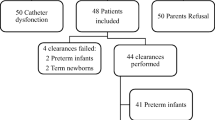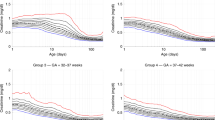Abstract
In this edition of Pediatric Nephrology, Milena Treiber and colleagues have published a study on cystatin C (CysC) concentrations in relation to renal volumetry in 50 small-for-gestational age (SGA) and 50 appropriate-for-gestational age (AGA) neonates, deriving a new formula for estimating neonatal glomerular filtration rate (GFR). The study builds on previous work which established that renal volumetry together with CysC blood levels is a superior method for establishing GFR in term and pre-term newborns [The Journal of Pediatrics (2014) 164:1026–1031.e2]. Treiber et al. use the expected difference between SGA and AGA renal volumes to document the superiority of their new formula, which is based on total renal volume, CysC and body surface area, but does not incorporate gold-standard inulin clearance. Treiber et al.’s study adds new knowledge to the field that will hopefully improve the safety of renally excreted critical dose drugs in the newborn period. This editorial discusses the strengths and limitations of the current study.
Similar content being viewed by others
References
Filler G, Browne R, Seikaly MG (2003) Glomerular filtration rate as a putative ‘surrogate end-point’ for renal transplant clinical trials in children. Pediatr Transplant 7:18–24
Motohashi H, Inui K (2013) Organic cation transporter OCTs (SLC22) and MATEs (SLC47) in the human kidney. AAPS J 15:581–588
Burckhardt G (2012) Drug transport by Organic Anion Transporters (OATs). Pharmacol Ther 136:106–130
Filler G, Grimmer J, Huang SHS, Bariciak E (2012) Cystatin C for the assessment of GFR in neonates with congenital renal anomalies. Nephrol Dial Transplant 27:3382–3384
Choi YJ, Baranowska-Daca E, Nguyen V, Koji T, Ballantyne CM, Sheikh-Hamad D, Suki WN, Truong LD (2000) Mechanism of chronic obstructive uropathy: increased expression of apoptosis-promoting molecules. Kidney Int 58:1481–1491
Kearns GL, Abdel-Rahman SM, Alander SW, Blowey DL, Leeder JS, Kauffman RE (2003) Developmental pharmacology—drug disposition, action, and therapy in infants and children. N Engl J Med 349:1157–1167
Lumbers ER (1995) Functions of the renin–angiotensin system during development. Clin Exp Pharmacol Physiol 22:499–505
Strauss J, Daniel SS, James LS (1981) Postnatal adjustment in renal function. Pediatrics 68:802–808
Chevalier RL (1982) Functional adaptation to reduced renal mass in early development. Am J Physiol 242:F190–F196
Filler GM (2011) The challenges of assessing acute kidney injury in infants. Kidney Int 80:567–568
Barnett HL, McNamara H, Hare RS, Hare K (1948) Inulin, urea, mannitol, and PAH clearance ratios in premature infants. Fed Proc 7:5–6
Toth-Heyn P, Drukker A, Guignard JP (2000) The stressed neonatal kidney: from pathophysiology to clinical management of neonatal vasomotor nephropathy. Pediatr Nephrol 14:227–239
Loebstein R, Koren G (1998) Clinical pharmacology and therapeutic drug monitoring in neonates and children. Pediatr Rev 19:423–428
Solhaug MJ, Wallace MR, Granger JP (1990) Role of renal interstitial hydrostatic pressure in the blunted natriuretic response to saline loading in the piglet. Pediatr Res 28:460–463
Filler G, Yasin A, Medeiros M (2014) Methods of assessing renal function. Pediatr Nephrol 29:183–192
Huang SH, Sharma AP, Yasin A, Lindsay RM, Clark WF, Filler G (2011) Hyperfiltration affects accuracy of creatinine eGFR measurement. Clin J Am Soc Nephrol 6:274–280
Moore WM (1971) Placental permeability to creatinine and urea. J Reprod Fertil 25:456
Bariciak E, Abeeryasin HJ, Walker M, Lepage N, Filler G (2011) Preliminary reference intervals for cystatin C and beta-trace protein in preterm and term neonates. Clin Biochem 44:1156–1159
Filler G, Bokenkamp A, Hofmann W, Le Bricon T, Martinez-Bru C, Grubb A (2005) Cystatin C as a marker of GFR–history, indications, and future research. Clin Biochem 38:1–8
Dharnidharka VR, Kwon C, Stevens G (2002) Serum cystatin C is superior to serum creatinine as a marker of kidney function: a meta-analysis. Am J Kidney Dis 40:221–226
Pham-Huy A, Leonard M, Lepage N, Halton J, Filler G (2003) Measuring glomerular filtration rate with cystatin C and [beta]-trace protein in children with spina bifida. J Urol 169:2312–2315
Sharma AP, Kathiravelu A, Nadarajah R, Yasin A, Filler G (2009) Body mass does not have a clinically relevant effect on cystatin C eGFR in children. Nephrol Dial Transplant 24:470–474
Schwartz GJ, Schneider MF, Maier PS, Moxey-Mims M, Dharnidharka VR, Warady BA, Furth SL, Munoz A (2012) Improved equations estimating GFR in children with chronic kidney disease using an immunonephelometric determination of cystatin C. Kidney Int 82:445–453
Lee JH, Hahn WH, Ahn J, Chang JY, Bae CW (2013) Serum cystatin C during 30 postnatal days is dependent on the postconceptional age in neonates. Pediatr Nephrol 28:1073–1078
Filler G, Lepage N (2013) Cystatin C adaptation in the first month of life. Pediatr Nephrol 28:991–994
Treiber M, Pecovnik Balon B, Gorenjak M (2014) A new serum Cystatin-C formula for estimation of glomerular filtration rate in newborns. Pediatr Nephrol. doi:10.1007/s00467-014-3029-7
Di Zazzo G, Stringini G, Matteucci MC, Muraca M, Malena S, Emma F (2011) Serum creatinine levels are significantly influenced by renal size in the normal pediatric population. Clin J Am Soc Nephrol 6:107–113
Kandasamy Y, Smith R, Wright IM, Lumbers ER (2013) Extra-uterine renal growth in preterm infants: oligonephropathy and prematurity. Pediatr Nephrol 28:1791–1796
Singh GR, Hoy WE (2004) Kidney volume, blood pressure, and albuminuria: findings in an Australian aboriginal community. Am J Kidney Dis 43:254–259
Brennan S, Kandasamy Y (2013) Renal parenchymal thickness as a measure of renal growth in low-birth-weight infants versus normal-birth-weight infants. Ultrasound Med Biol 39:2315–2320
Abitbol CL, Seeherunvong W, Galarza MG, Katsoufis C, Francoeur D, Defreitas M, Edwards-Richards A, Master Sankar Raj V, Chandar J, Duara S, Yasin S, Zilleruelo G (2014) Neonatal kidney size and function in preterm infants: what is a true estimate of glomerular filtration rate? J Pediatr 164(1026–1031):e1022
Hricak H, Lieto RP (1983) Sonographic determination of renal volume. Radiology 148:311–312
Nielsen EI, Sandstrom M, Honore PH, Ewald U, Friberg LE (2009) Developmental pharmacokinetics of gentamicin in preterm and term neonates: population modelling of a prospective study. Clin Pharmacokinet 48:253–263
Plebani M, Mussap M, Bertelli L, Moggi G, Ruzzante N, Fanos V, Cataldi L (1997) Determination of blood cystatin C in pregnant women during labor and in their newborns. Pediatr Med Chir 19:325–329
Cataldi L, Mussap M, Bertelli L, Ruzzante N, Fanos V, Plebani M (1999) Cystatin C in healthy women at term pregnancy and in their infant newborns: relationship between maternal and neonatal serum levels and reference values. Am J Perinatol 16:287–295
Bokenkamp A, Dieterich C, Dressler F, Muhlhaus K, Gembruch U, Bald R, Kirschstein M (2001) Fetal serum concentrations of cystatin C and beta2-microglobulin as predictors of postnatal kidney function. Am J Obstet Gynecol 185:468–475
Filler G, Kusserow C, Lopes L, Kobrzynski M (2014) Beta-trace protein as a marker of GFR–history, indications, and future research. Clin Biochem 47:1188–1194
Filler G, Lopes L, Harrold J, Bariciak E (2014) beta-trace protein may be a more suitable marker of neonatal renal function. Clin Nephrol 81:269–276
Yasin A, Filler G (2013) Evaluating Canadian children: WHO, NHANES or what? J Paediatr Child Health 49:282–290
Contrepois A, Brion N, Garaud JJ, Faurisson F, Delatour F, Levy JC, Deybach JC, Carbon C (1985) Renal disposition of gentamicin, dibekacin, tobramycin, netilmicin, and amikacin in humans. Antimicrob Agents Chemother 27:520–524
Author information
Authors and Affiliations
Corresponding author
Rights and permissions
About this article
Cite this article
Filler, G. A step forward towards accurately assessing glomerular filtration rate in newborns. Pediatr Nephrol 30, 1209–1212 (2015). https://doi.org/10.1007/s00467-014-3014-1
Received:
Revised:
Accepted:
Published:
Issue Date:
DOI: https://doi.org/10.1007/s00467-014-3014-1




